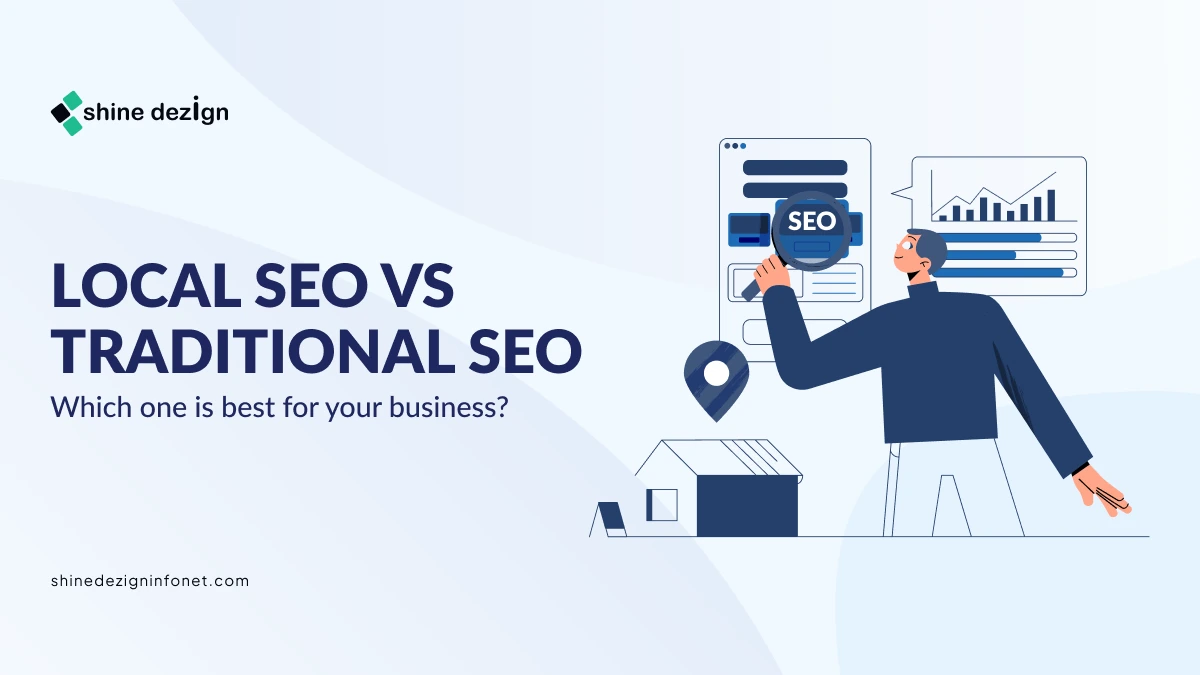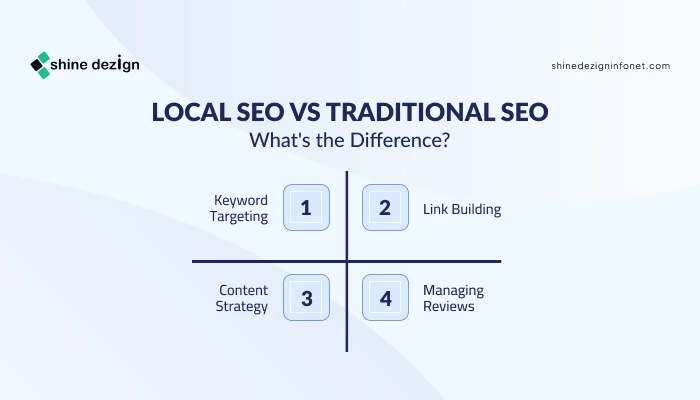Table of Contents
Around 2.64 billion users shop online worldwide (source: Statista). According to various reports, users mostly prefer shopping online, so the question arises: Does it make sense to do search engine optimization?
There are two primary approaches to SEO: local SEO and traditional SEO. Both help optimize your website’s visibility in search engine results pages (SERPs) and increase traffic to your website. Therefore, to help you, we have provided a detailed guide on local SEO vs. traditional SEO and how they can help you optimize your website. Firstly, let’s understand local SEO and traditional SEO.
Understanding Local SEO
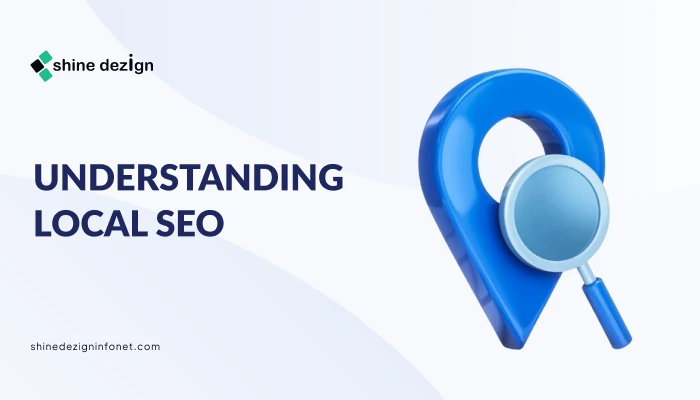 When a user enters a Google search query, Google understands the intent behind that search result. For instance, if you visit California and search for the best coffee shop nearby, Google recognizes that users have local intent, so it immediately shifts to its local algorithms and delivers relevant results tailored to California.
When a user enters a Google search query, Google understands the intent behind that search result. For instance, if you visit California and search for the best coffee shop nearby, Google recognizes that users have local intent, so it immediately shifts to its local algorithms and delivers relevant results tailored to California.
Therefore, local intent always means the user is looking for something nearby, whether it’s a resort, a coffee shop, cleaning services, or pet care. Let’s consider an example: if you’re searching for burger delivery near your office, you’ll see a list of nearby burger places. In contrast, searching for a burger delivery near your home will show different results. If you type the exact query, you will see a new list of locations near your home.
So that’s how Google’s local algorithm works. It knows where you are searching for a burger place close to your current location without adding “near me” or your city name to the query. Now, you might be thinking local SEO is easier.
Is local SEO easy?
Local SEO can be easy if you reach a small, geo-specific audience instead of a worldwide one. For instance, let’s say you are running a shoe business in Florida. When users search for Sports shoes in Florida, they can get a list of sports shoe shops in Florida, which would rank more easily.
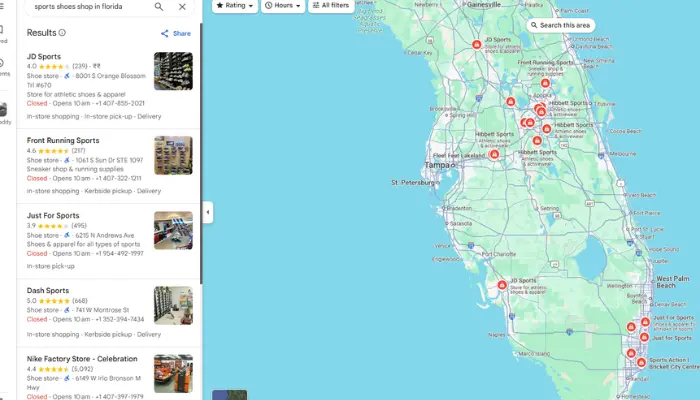 However, if you are trying to rank your store for a generic term like ‘sports shoes’ across the country or the globe, it would be challenging to achieve a high ranking. Therefore, local SEO is challenging for businesses with multiple locations that need to rank for different cities, such as sports shoes in ABC City. It can become more difficult.
However, if you are trying to rank your store for a generic term like ‘sports shoes’ across the country or the globe, it would be challenging to achieve a high ranking. Therefore, local SEO is challenging for businesses with multiple locations that need to rank for different cities, such as sports shoes in ABC City. It can become more difficult.
Understanding Traditional SEO
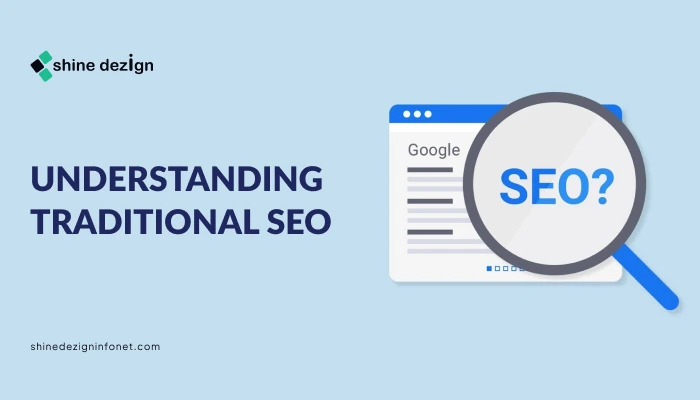 Traditional SEO, also known as organic SEO, is the classic approach of optimizing one page at a time. You perform keyword research, write top-notch quality content targeting particular topics or queries to optimize on-page elements like headings, title tags, etc., and develop backlinks.
Traditional SEO, also known as organic SEO, is the classic approach of optimizing one page at a time. You perform keyword research, write top-notch quality content targeting particular topics or queries to optimize on-page elements like headings, title tags, etc., and develop backlinks.
Traditional SEO techniques mainly focus on creating relevant content for each target keyword. For instance, if you want to rank for Shopify store optimization tips, write a compelling blog post on that subject and optimize it thoroughly.
Is traditional SEO Effective in 2026?
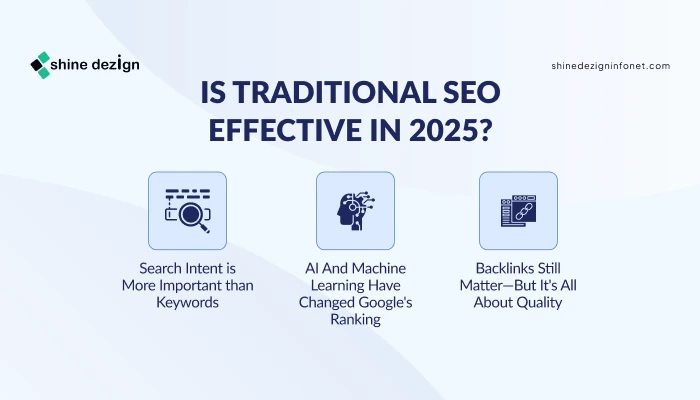 Artificial Intelligence is taking up the digital world. The search landscape is becoming increasingly AI-enhanced, with the emergence of more AI models and ongoing updates from Google.
Artificial Intelligence is taking up the digital world. The search landscape is becoming increasingly AI-enhanced, with the emergence of more AI models and ongoing updates from Google.
However, traditional SEO is not outdated; it needs to be combined with modern strategies and a deeper understanding of the field. It best includes user expectations, algorithm changes, and user behavior. Let’s explore how to perform effective traditional search engine optimization (SEO).
Search Intent is More Important than Keywords
A significant shift in SEO is the transition from keyword-focused strategies to intent-driven content. The traditional method primarily involved identifying high-volume keywords and incorporating them into web pages and blog content. This practice is not only outdated but can also impact ranking.
Search engines can now interpret the context and meaning behind a search query to understand phrasing, synonyms, and user intent. So, instead of focusing on what users are typing, Modern SEO strategies should focus on why there is research and craft content that addresses the user’s intent.
AI And Machine Learning Have Changed Google’s Ranking
Google’s search algorithm heavily relies on machine learning and user behavior data. It’s no longer restricted to backlinks or keywords. Metrics such as click-through rate (CTR), dwell time, and bounce rate are used to determine the value and relevance of content.
If users engage with your page, spend time reading, or interact with other elements, Google interprets that as a sign of high-quality content. On the other hand, if users leave quickly or return to the search results to click on another link, it can signal that your content did not meet their needs. That’s why content must be informative, well-structured, engaging, and easy to navigate.
Backlinks Still Matter—But It’s All About Quality
Backlinks remain one of Google’s strongest ranking signals, but the game has changed. While regular SEO often focuses on volume through tactics such as directory listings and low-quality guest posts, modern SEO prioritizes link quality over quantity. Backlinks from high-authority sites, especially those relevant to your niche (like news organizations, government sites, or recognized industry leaders), are incredibly valuable. Earning these links through great content, digital PR, and authentic outreach will have a much more substantial impact than outdated link-building methods.
Local SEO vs Traditional SEO: What’s the Difference?
 Keyword Targeting
Keyword Targeting
Keyword Targeting is among the significant differences between local SEO and traditional SEO. Local SEO primarily targets geo-specific keywords, such as [X keyword] + state or [X keyword] + city, while conventional SEO focuses on general keywords that are not location-oriented. Moreover, Local SEO attracts nearby clients searching for their services online.
Traditional SEO campaigns target more generic keywords that are geographic-specific. These keywords are primarily broad and designed to attract a wider audience. For instance, if you own a coffee shop in Texas, your traditional SEO campaign may target keywords such as “best coffee in the US” or “authentic Coffee in the US.” In contrast, for a local SEO campaign, we aim to target keywords that incorporate the city name or area where your shop is situated, such as “Best Coffee Shop in Texas.”
Content Strategy
Another key difference in the local SEO vs SEO debate is the content strategy. Local SEO campaigns primarily focus on creating location-specific content, such as blog posts about local events or landmarks, to enhance visibility in search engine results. Conventional SEO campaigns mainly focus on creating high-quality, informative content that appeals to a broader audience.
In SEO campaigns, local SEO company mainly focus on creating location-specific content that targets clients in particular geographical areas. For instance, a real estate company in Dallas may create blog posts about the local hosting market, including news, trends, and statistics relevant to the city. Moreover, the organization may also create content that offers tips for purchasing or selling a home in Dallas, including information about local schools, neighborhoods, and amenities.
Link Building
Link building is a vital factor in SEO, which involves creating backlinks from other websites to your own. It helps search engines easily recognize your website as a trusted source of information and maximize its visibility in search results.
When comparing local SEO vs SEO, the backlink strategies differ significantly. In local SEO services, the primary focus is optimizing a website for a particular location. Local SEO link-building strategies focus on increasing the number of backlinks from local directories or websites to a business’s website.
In contrast, traditional SEO services focus on enhancing the visibility of websites in search engine results pages (SERPs) for relevant keywords, regardless of geographic location. Traditional SEO link-building strategies focus on developing links from high-authority websites in the same industry or niche. Therefore, the idea is to get links from websites with high domain and page authority.
Managing Reviews
Managing reviews and reputation is a vital factor of a local SEO audit that can hugely impact a business’s online reputation and visibility. Local companies primarily rely on client reviews to attract new clients and establish trust with their existing client base. When potential clients search for local businesses, they mainly look for reviews and ratings to assess the quality of the services or products offered.
As a result, local SEO campaigns also encourage clients to leave reviews on platforms like Google My Business or Yelp, as these reviews can help maximize business visibility in local search results and influence potential clients’ decisions.
Traditional SEO campaigns often prioritize building backlinks from high-authority websites, creating top-quality content, and engaging with social media followers to enhance the website’s overall online reputation.
Local SEO vs Traditional SEO: Comparison Table
| Aspect | Traditional SEO | Local SEO |
| Target Audience | Broad, national, or global reach | Local or city-specific audience |
| Keyword Strategy | General keywords (e.g., “best plumber“) | Geo-specific keywords (e.g., “best plumber in Chicago“) |
| Google Business Profile | Not essential | Critical for visibility in local search and Google Maps |
| Reviews & Ratings | Helpful for trust | Direct ranking factor in local search results |
| Ranking Goal | Organic search positions in general SERPs | Appear in the local pack (Map results) and local listings |
Summing Up
Traditional SEO focuses on enhancing a website’s visibility on a national or global level, targeting broad keywords and aiming for high rankings in general search engine results. It’s ideal for online businesses, blogs, SaaS platforms, or any service not restricted by location.
Local SEO, on the other hand, is designed to help businesses rank in geographically specific searches, particularly for users seeking nearby services. It relies heavily on tools like Google Business Profile, customer reviews, NAP consistency, and local keywords. The goal is to dominate search results in a specific city or area and appear in Google’s Local 3-Pack (map results).
In short, if you’re targeting a local customer base, like a dentist, restaurant, or repair service, Local SEO is essential. For broader reach across regions or industries, Traditional SEO remains the backbone.


